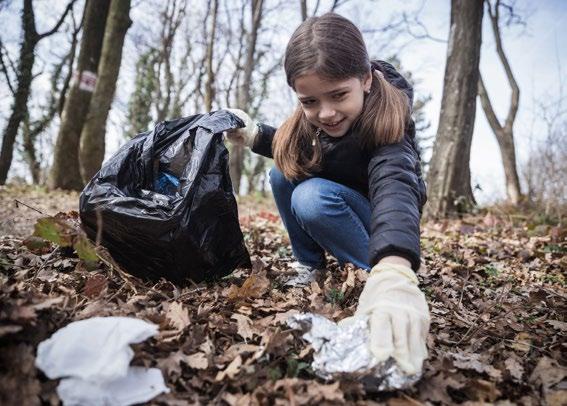| 25
What Dog Poop Has to Do with Teaching Children Initiative FRANK SCHOFIELD superintendent, Logan City School District
HAVE YOU EVER BEEN in situations where you noticed a problem that needed to be fixed, and then wondered why nobody had put forth the time or energy to fix it? This is the situation that Kirk Weisler describes in his book, “The Dog Poop Initiative,” based on his own real-life experience.
Whether it be in the home, school, or the workplace, the ability to effectively show initiative helps us manage our time and tasks more successfully. This will often provide us with additional opportunities for leadership and growth, while putting us in positions to make positive changes in the world around us.
In the book, a young father and his son arrive at a little league soccer game and find parents, players, and referees pointing out a pile of dog poop in the middle of the playing field. Various conversations were taking place regarding how to make sure everyone knew about the pile, how to make sure the players didn’t step in the pile, and how to prevent the soccer ball from hitting the pile. Another team had even attempted to play their game around the pile, all while trying to make sure the pile of poop didn’t disrupt the game.
How can parents help their children develop initiative? Although the specific steps will vary depending on each family, some basic actions include:
As the young father and his son watched these conversations taking place, they looked at one another in confusion. The father then pulled a piece of a cardboard box out of a nearby trash can, used the piece of cardboard to clean up the pile, and placed the pile of poop in a trash can. This allowed the players to play their game without further concern, and everyone to enjoy the rest of the day. Mr. Weisler used this story to illustrate the differences between Poopers (individuals and situations that create problems), Pointers (individuals who simply identify problems), and Scoopers (those who take action to resolve problems), but the underlying message of the story is the importance of showing initiative. Initiative, or the ability to assess situations and take action independently, is a key attribute of successful children and adults.
Modeling Children need to see what initiative looks like and understand why we do what we do that shows initiative. I have a friend who, when driving in his truck, will stop if there is trash in the road so he can pick it up and throw it in the truck bed. When his children ask why, he explains that we all have a responsibility to take care of problems when we see them, so he will take the initiative to fix them when he can. Modeling initiative, and explaining why we do what we do, is the first step to helping children develop that habit.
Enabling It is difficult to take initiative if we lack the tools or skills to do so. If the goal is to have children take initiative in doing their own laundry, then training and tools need to be provided for them (i.e., laundry detergent needs to be safely within their reach, they need to know how to operate the washing machine, etc). When parents think through what training and tools need to be provided in order for a child to successfully take initiative, it is more likely that children will perceive they can.
Celebrating Taking initiative is a learned habit and any time we develop new habits it is likely we will stumble along the way ( just think of the last time you started a new diet and exercise regimen). When we see children taking initiative it is essential that we recognize and celebrate their efforts, even if the efforts were not completely successful (i.e., a red sock was washed with the white clothes, the cast iron frying pan was scrubbed so hard it lost its seasoning, or the newly sprouted carrots were pulled up with the weeds). Mistakes can be corrected, but if children feel their efforts at taking initiative were the problem, they will be less likely to take initiative in the future. Reinforcement of the desired behavior will allow them to develop the skill of taking initiative, while improving their ability to perform the specific task successfully. In the story of The Dog Poop Initiative, the outcome was that a soccer game was able to be played without interruption. In our own lives, teaching children to successfully take initiative can improve our homes and communities, and prepare children for greater success in their future endeavors.












